the classics
传承儒家经典的英语作文

传承儒家经典的英语作文Inheriting the Classics of Confucianism。
Confucianism, as one of the most important andinfluential philosophical and ethical systems in Chinese history, has had a profound impact on Chinese culture and society for thousands of years. The classics of Confucianism, including The Analects, The Great Learning, The Doctrine of the Mean, and The Mencius, have been widely studied and revered by scholars and intellectualsthroughout Chinese history. In recent years, there has been a renewed interest in the study and interpretation of these classics, as people seek to understand and apply the wisdom of Confucianism to contemporary life.The Analects, a collection of sayings and ideas attributed to Confucius and his disciples, is perhaps the most well-known and widely studied of the Confucian classics. It emphasizes the importance of moral cultivation, self-improvement, and the cultivation of virtue in thepursuit of a harmonious and well-ordered society. The Great Learning and The Doctrine of the Mean, two other important Confucian classics, further expound on the principles ofself-cultivation, ethical conduct, and the proper governance of society. The Mencius, named after the philosopher Mencius, elaborates on the Confucian concept of human nature and the importance of benevolence, righteousness, and proper governance.In order to inherit and carry forward the wisdom of Confucianism, it is important for us to study andunderstand these classics in a deep and meaningful way.This involves not only reading and memorizing the texts,but also engaging in critical thinking, discussion, and reflection on their meanings and implications for our lives. Moreover, it requires us to apply the principles and values of Confucianism in our daily lives, and to promote them in our communities and society at large.One of the key ways to inherit the classics of Confucianism is through education. By incorporating the study of Confucian classics into the curriculum of schoolsand universities, we can ensure that future generationshave the opportunity to learn about and appreciate the wisdom of Confucianism. This will help to cultivate a sense of moral responsibility, social harmony, and ethicalconduct among young people, and to instill in them a deep respect for the cultural heritage of China.Another important way to inherit the classics of Confucianism is through the promotion of traditional Chinese culture and values. This can be done throughvarious means, such as organizing lectures, seminars, and workshops on Confucianism, as well as through thepublication of books, articles, and other educational materials on the subject. Furthermore, we can also use modern technology, such as the internet and social media,to spread the teachings of Confucianism to a wider audience, both within China and around the world.In addition, it is crucial for us to integrate the principles of Confucianism into our social and political life. This means promoting the values of benevolence, righteousness, and propriety in our interactions withothers, as well as advocating for good governance, social justice, and the common good. By doing so, we can help to create a more harmonious, ethical, and prosperous society, in line with the teachings of Confucianism.In conclusion, the classics of Confucianism represent a rich and profound heritage of wisdom and ethical valuesthat have the power to guide and inspire us in our lives. By studying, understanding, and applying the principles of Confucianism, and by promoting them in our education, culture, and society, we can ensure that the legacy of Confucianism continues to enrich and enlighten us for generations to come. Let us all work together to inherit and carry forward the classics of Confucianism, and to create a better future for ourselves and for the world.。
2014年naew中国学生英文写作能力调研优秀作文集“Let the classics be classics” (89)
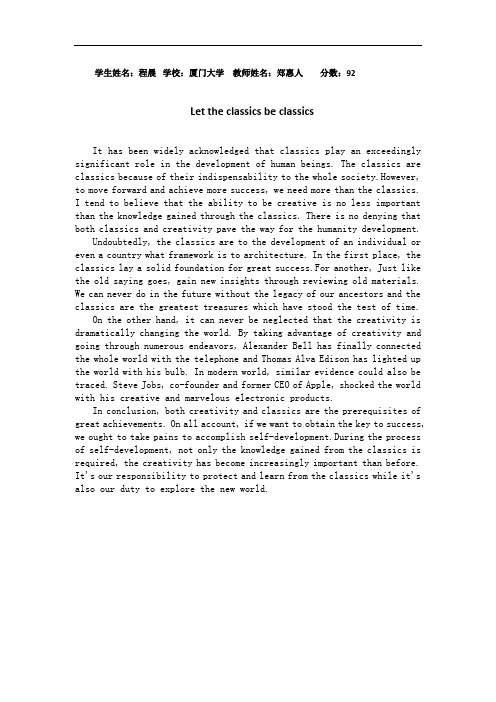
学生姓名:程晨学校:厦门大学教师姓名:郑惠人分数:92Let the classics be classicsIt has been widely acknowledged that classics play an exceedingly significant role in the development of human beings. The classics are classics because of their indispensability to the whole society.However, to move forward and achieve more success, we need more than the classics.I tend to believe that the ability to be creative is no less important than the knowledge gained through the classics. There is no denying that both classics and creativity pave the way for the humanity development.Undoubtedly, the classics are to the development of an individual or even a country what framework is to architecture. In the first place, the classics lay a solid foundation for great success.For another, Just like the old saying goes, gain new insights through reviewing old materials. We can never do in the future without the legacy of our ancestors and the classics are the greatest treasures which have stood the test of time.On the other hand, it can never be neglected that the creativity is dramatically changing the world. By taking advantage of creativity and going through numerous endeavors, Alexander Bell has finally connected the whole world with the telephone and Thomas Alva Edison has lighted up the world with his bulb. In modern world, similar evidence could also be traced. Steve Jobs, co-founder and former CEO of Apple, shocked the world with his creative and marvelous electronic products.In conclusion, both creativity and classics are the prerequisites of great achievements. On all account, if we want to obtain the key to success, we ought to take pains to accomplish self-development.During the process of self-development, not only the knowledge gained from the classics is required, the creativity has become increasingly important than before. It's our responsibility to protect and learn from the classics while it's also our duty to explore the new world.。
classics与me英语作文
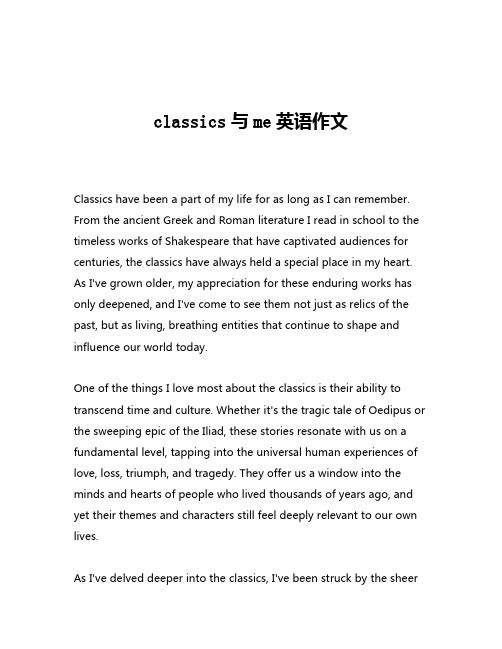
classics与me英语作文Classics have been a part of my life for as long as I can remember. From the ancient Greek and Roman literature I read in school to the timeless works of Shakespeare that have captivated audiences for centuries, the classics have always held a special place in my heart. As I've grown older, my appreciation for these enduring works has only deepened, and I've come to see them not just as relics of the past, but as living, breathing entities that continue to shape and influence our world today.One of the things I love most about the classics is their ability to transcend time and culture. Whether it's the tragic tale of Oedipus or the sweeping epic of the Iliad, these stories resonate with us on a fundamental level, tapping into the universal human experiences of love, loss, triumph, and tragedy. They offer us a window into the minds and hearts of people who lived thousands of years ago, and yet their themes and characters still feel deeply relevant to our own lives.As I've delved deeper into the classics, I've been struck by the sheerbreadth and depth of human experience they encompass. From the philosophical musings of Plato to the searing social commentary of Dickens, these works grapple with the most profound questions of human existence – the nature of reality, the meaning of life, the struggle between good and evil. In their pages, I've found solace, inspiration, and a deeper understanding of myself and the world around me.But the classics aren't just about the past – they're also deeply connected to the present. Many of the ideas and concepts that we take for granted today have their roots in the works of ancient thinkers and writers. The principles of democracy, the foundations of modern science, the very language we use to express ourselves – all of these have been shaped and influenced by the classics in ways that are often invisible to us.As I've grown older, I've also come to appreciate the way the classics can be reinterpreted and reimagined for new generations. Whether it's a modern film adaptation of Hamlet or a graphic novel version of the Odyssey, the classics are constantly being reinvented and recontextualized, keeping them alive and relevant in our ever-changing world.In my own life, the classics have been a source of both comfort and challenge. When I'm feeling lost or overwhelmed, I can turn to thetimeless wisdom of the ancients and find solace in their words. But the classics have also pushed me to think more deeply, to question my assumptions, and to grapple with the most complex and difficult questions of human existence.One of the most profound ways the classics have impacted my life is through their ability to foster empathy and understanding. By immersing myself in the lives and perspectives of characters from vastly different cultures and time periods, I've been able to develop a deeper appreciation for the diversity of human experience. I've learned to see the world through the eyes of others, to recognize the common threads that bind us all together, and to approach even the most challenging and contentious issues with a spirit of openness and compassion.At the same time, the classics have also challenged me to be a more critical and engaged reader. As I've delved deeper into these works, I've come to understand that they are not simply passive vessels of information, but rather living, breathing entities that require active engagement and interpretation. I've had to grapple with complex themes, navigate ambiguous moral landscapes, and wrestle with the sometimes contradictory and unsettling perspectives of the authors.But for me, this challenge has been one of the greatest joys of engaging with the classics. The process of wrestling with these works,of struggling to understand their deeper meanings and implications, has been a deeply rewarding and transformative experience. It has pushed me to grow as a reader, a thinker, and a human being, and has given me a deeper appreciation for the power of language and the written word.Ultimately, I believe that the classics are not just relics of the past, but living, breathing entities that continue to shape and influence our world today. They offer us a window into the human experience, a means of connecting with the stories and perspectives of people who lived thousands of years ago, and a way of grappling with the most profound questions of human existence.As I look to the future, I know that the classics will continue to be a central part of my life. Whether I'm revisiting old favorites or discovering new works, I will always be drawn to the timeless wisdom and insight they offer. And I hope that, in my own small way, I can help to keep these classics alive and relevant for generations to come, inspiring others to engage with these enduring works and to find their own unique connections to the rich tapestry of human experience.。
让经典成为经典英语作文
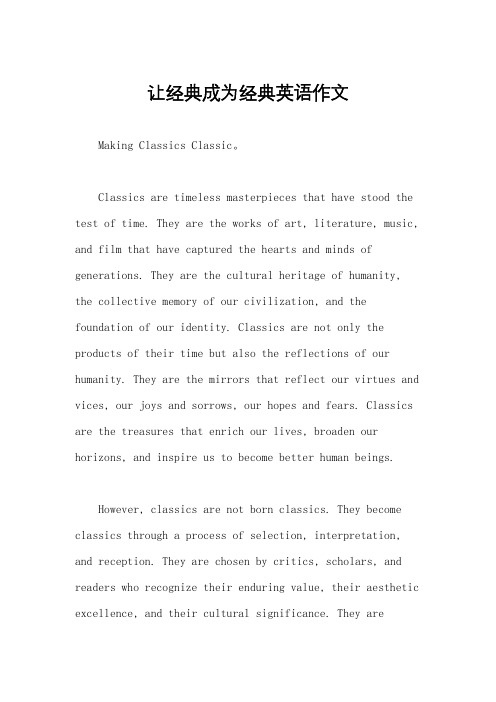
让经典成为经典英语作文Making Classics Classic。
Classics are timeless masterpieces that have stood the test of time. They are the works of art, literature, music, and film that have captured the hearts and minds of generations. They are the cultural heritage of humanity, the collective memory of our civilization, and the foundation of our identity. Classics are not only the products of their time but also the reflections of our humanity. They are the mirrors that reflect our virtues and vices, our joys and sorrows, our hopes and fears. Classics are the treasures that enrich our lives, broaden our horizons, and inspire us to become better human beings.However, classics are not born classics. They become classics through a process of selection, interpretation, and reception. They are chosen by critics, scholars, and readers who recognize their enduring value, their aesthetic excellence, and their cultural significance. They areinterpreted by artists, writers, and intellectuals who add their own perspectives, insights, and emotions to the original texts. They are received by audiences, readers, and viewers who appreciate their beauty, relevance, and impact on their lives. In short, classics are the result of a complex and dynamic interaction between the creators, the interpreters, and the receivers.To make classics classic, we need to preserve, promote, and renew them. We need to preserve their original texts, artifacts, and performances as the authentic and authoritative sources of their meaning and value. We need to promote their accessibility, diversity, and relevance to reach wider and more diverse audiences, and to engage them in meaningful and creative ways. We need to renew their relevance, vitality, and creativity by adapting, remixing, and reimagining them in new and innovative forms that resonate with the contemporary world and its challenges.Preserving classics means safeguarding their authenticity, integrity, and uniqueness. It meansprotecting them from censorship, distortion, andmanipulation that might undermine their originality and value. It means conserving their physical and digital forms, such as manuscripts, paintings, films, and recordings, as the tangible and irreplaceable evidence of their historical and cultural significance. It means restoring and reconstructing them when they are damaged, lost, or destroyed, so that they can continue to inspire andenlighten future generations.Promoting classics means making them more accessible, inclusive, and relevant to diverse audiences. It means translating them into different languages, formats, and media that can reach people from different cultures, backgrounds, and ages. It means adapting them to different contexts, genres, and platforms that can engage people in different ways and contexts. It means creating new worksthat draw inspiration from classics, such as sequels, prequels, spin-offs, and fan fiction, that can extend and enrich the original stories and characters.Renewing classics means revitalizing their relevance, vitality, and creativity. It means adapting them to thecontemporary world and its challenges, such as social, political, and environmental issues, that can resonate with the current and future generations. It means remixing them with different genres, styles, and forms that can create new and unexpected meanings and emotions. It means reimagining them with different perspectives, voices, and identities that can challenge and expand the originalvision and scope.In conclusion, making classics classic is a continuous and collaborative process that involves the creators, the interpreters, and the receivers. It requires us to preserve, promote, and renew the classics in ways that respect their originality, diversity, and relevance. It requires us to appreciate and celebrate the classics as the cultural heritage of humanity, the source of our inspiration, andthe reflection of our humanity. It requires us to pass on the classics to the future generations as the legacy of our civilization, the gift of our creativity, and the hope of our aspirations.。
2019-2020同步译林英语选修八新突破讲义:Unit+1+Section+Ⅰ Reading(Ⅰ
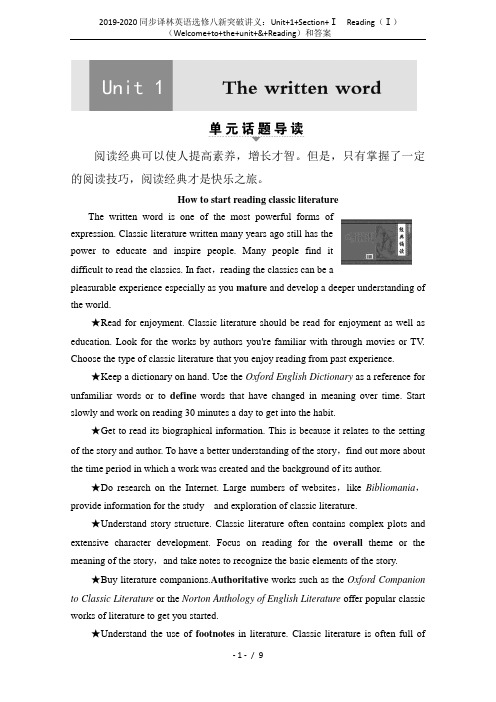
阅读经典可以使人提高素养,增长才智。
但是,只有掌握了一定的阅读技巧,阅读经典才是快乐之旅。
How to start reading classic literatureThe written word is one of the most powerful forms ofexpression. Classic literature written many years ago still has thepower to educate and inspire people. Many people find itdifficult to read the classics. In fact,reading the classics can be apleasurable experience especially as you mature and develop a deeper understanding of the world.★Read for enjoyment. Classic literature should be read for enjoyment as well as education. Look for the works by authors you're familiar with through movies or TV. Choose the type of classic literature that you enjoy reading from past experience.★Keep a dictionary on hand. Use the Oxford English Dictionary as a reference for unfamiliar words or to define words that have changed in meaning over time. Start slowly and work on reading 30 minutes a day to get into the habit.★Get to read its biographical information. This is because it relates to the setting of the story and author. To have a better understanding of the story,find out more about the time period in which a work was created and the background of its author.★Do research on the Internet. Large numbers of websites,like Bibliomania,provide information for the study and exploration of classic literature.★Understand story structure. Classic literature often contains complex plots and extensive character development. Focus on reading for the overall theme or the meaning of the story,and take notes to recognize the basic elements of the story.★Buy literature companions.Authoritative works such as the Oxford Companion to Classic Literature or the Norton Anthology of English Literature offer popular classic works of literature to get you started.★Understand the use of footnotes in literature. Classic literature is often full ofreferences to social and culture elements of the past. Footnotes may be used to explain these references and make the material easier to understand.[阅读障碍词]1.mature v.成熟2.define v. 使明确3.overall adj.总的,全体的4.authoritative adj.权威性的5.footnote n. 脚注[诱思导读]阅读文章,回答下面的问题1.Classic literature is too difficult for us to read now. Do you think so?Yes,I think so.Though difficult,it can be read little by little.2.Which tip do you think is the most useful while reading the classics?The last tip. Because I think footnotes are helpful to me.Section ⅠReading(Ⅰ)(Welcome to the unit& Reading)Ⅰ.匹配下列单词的词性及汉语意思()1.poetry A.n.小说家()2.characteristic B.n.诗歌()3.novelist C.vt.虐待;辱骂;滥用()4.abuse D.adj.铤而走险的,拼命的,绝望的;非常需要,渴望()5.desperate E.n.特征,特点adj.典型的,独特的,特有的()6.twist F.adj.慷慨的,大方的;宽厚的,仁慈的()7.generous G.adj.弯曲的;驼背的;不诚实的n.天赋,爱好()8.rigid H.adj.暴力的,粗暴的;猛烈的,强烈的()9.bent I.n.转折,转变;转动;急转弯vt.& vi.(使)弯曲;转动;蜿蜒()10.violent J.adj.死板的,僵化的,固执的;坚硬的,僵直的[答案]1-5BEACD6-10IFJGHⅡ.选择下列句中词组的汉语意思found evidence to prove him guilty.()2.He is addicted to the films that are set in the World War Ⅱ.()3.You can't realize your dream unless you arebent on achieving it.()4.Congratulations! Your article came out inyesterday's newspaper.()5.Mom has been on the run all week preparing for Tom's wedding.()6.Daniel is an excellent boy; he never failed to live up to his parents' expectations.[答案]1-6CDABFEAppreciating literatureWhat is classic literature? Classics are the antiques(古董,文物) of the literary world.They are novels,plays and poems that were written a long time ago①and were so well written that people still read them nowadays②.They are examples of great writing and wisdom,and even those written centuries ago③can still be found in bookshops and libraries today.文学欣赏什么是经典文学?经典文学作品是文学世界里的古董。
《孔乙己》英文译本比较赏析
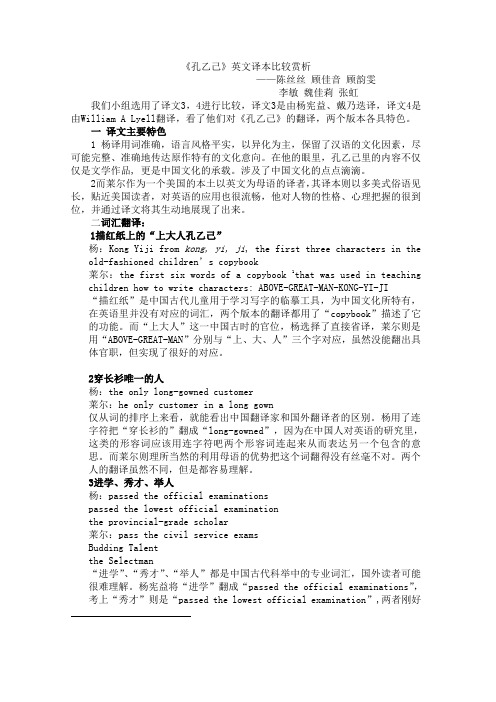
《孔乙己》英文译本比较赏析——陈丝丝顾佳音顾韵雯李敏魏佳莉张虹我们小组选用了译文3,4进行比较,译文3是由杨宪益、戴乃迭译,译文4是由William A Lyell翻译,看了他们对《孔乙己》的翻译,两个版本各具特色。
一译文主要特色1 杨译用词准确,语言风格平实,以异化为主,保留了汉语的文化因素,尽可能完整、准确地传达原作特有的文化意向。
在他的眼里,孔乙己里的内容不仅仅是文学作品, 更是中国文化的承载。
涉及了中国文化的点点滴滴。
2而莱尔作为一个美国的本土以英文为母语的译者,其译本则以多美式俗语见长,贴近美国读者,对英语的应用也很流畅,他对人物的性格、心理把握的很到位,并通过译文将其生动地展现了出来。
二词汇翻译:1描红纸上的“上大人孔乙己”杨:Kong Yiji from kong, yi, ji, the first three characters in the old-fashioned children’s copybook莱尔:the first six words of a copybook 1that was used in teaching children how to write characters: ABOVE-GREAT-MAN-KONG-YI-JI“描红纸”是中国古代儿童用于学习写字的临摹工具,为中国文化所特有,在英语里并没有对应的词汇,两个版本的翻译都用了“copybook”描述了它的功能。
而“上大人”这一中国古时的官位,杨选择了直接省译,莱尔则是用“ABOVE-GREAT-MAN”分别与“上、大、人”三个字对应,虽然没能翻出具体官职,但实现了很好的对应。
2穿长衫唯一的人杨:the only long-gowned customer莱尔:he only customer in a long gown仅从词的排序上来看,就能看出中国翻译家和国外翻译者的区别。
杨用了连字符把“穿长衫的”翻成“long-gowned”,因为在中国人对英语的研究里,这类的形容词应该用连字符吧两个形容词连起来从而表达另一个包含的意思。
向经典致敬作文600字

向经典致敬作文600字英文回答:To pay tribute to the classics is to honor the timeless works that have had a profound impact on our lives.Classics have the power to transcend time and culture, and they continue to resonate with readers across generations. They provide us with valuable insights into the human condition, offer thought-provoking ideas, and inspire us to reflect on our own lives.Classics are like a window to the past, allowing us to gain a deeper understanding of different historical periods and cultures. For example, reading Shakespeare's playsgives us a glimpse into Elizabethan England and the complexities of human emotions. The language may be archaic, but the themes of love, betrayal, and ambition areuniversal and still relevant today.Classics also serve as a source of inspiration forcontemporary writers and artists. They provide a foundation for new ideas and storytelling techniques. For instance, the works of Jane Austen have influenced countless romance novels and films, with their witty dialogue and exploration of social norms. Even modern-day adaptations like "Bridget Jones's Diary" draw inspiration from Austen's masterpiece, "Pride and Prejudice."Moreover, classics have the ability to evoke strong emotions and create a lasting impact on readers. The characters and their struggles become familiar to us, and we can relate to their experiences. Take, for instance, the novel "To Kill a Mockingbird" by Harper Lee. Through the eyes of Scout, we witness the injustice and racism prevalent in the American South during the 1930s. The story not only raises awareness about social issues but also encourages empathy and compassion.Classics also provide us with a sense of continuity and connection to the past. They remind us that human experiences and emotions are timeless and shared by people throughout history. For example, reading the works ofancient Greek philosophers like Plato and Aristotle allows us to contemplate the nature of existence and the pursuitof knowledge. Their ideas continue to shape our understanding of philosophy and ethics.In conclusion, classics hold a special place in our literary and cultural heritage. They offer us valuable insights, inspire creativity, evoke emotions, and connectus to the past. By paying tribute to the classics, we acknowledge their enduring significance and ensure thattheir wisdom and beauty are passed on to future generations.中文回答:向经典致敬是对那些对我们生活产生深远影响的永恒作品的敬意。
经典走进生活英语作文

经典走进生活英语作文The Classics in Daily LifeThe realm of classic literature is vast and diverse, encompassing a rich tapestry of timeless works that have captivated readers for generations. These literary masterpieces transcend the confines of their original contexts, seamlessly weaving their way into the fabric of our everyday lives. From the ancient epics of Homer to the poetic musings of Shakespeare, the classics have the power to shape our perspectives, inspire our imaginations, and provide a profound understanding of the human condition.One of the most striking ways in which the classics manifest in our daily lives is through their enduring influence on language and communication. The works of great writers have bequeathed us with a treasure trove of idioms, metaphors, and allusions that have become ingrained in our everyday speech. When we casually remark that someone is "a wolf in sheep's clothing" or that a situation is "a tempest in a teapot," we are unconsciously invoking the rich tapestry of literary tradition. These linguistic gems not only add depth andnuance to our conversations but also serve as a testament to the timeless relevance of the classics.Moreover, the classics have a profound impact on our cultural and artistic landscapes. The stories, characters, and themes that have captivated readers for centuries continue to inspire modern adaptations and reinterpretations. From the silver screen to the stage, from the canvas to the digital realm, the classics have been reborn in countless forms, each offering a unique perspective and a fresh take on the timeless narratives. Whether it's a cinematic retelling of "Romeo and Juliet" or a graphic novel interpretation of "The Odyssey," these reimagined classics breathe new life into the timeless tales, ensuring their continued relevance and resonance in the contemporary world.Beyond their artistic and linguistic influence, the classics also play a crucial role in shaping our intellectual and educational landscapes. The study of classic literature is a cornerstone of many educational systems, from primary schools to prestigious universities. By engaging with these seminal works, students develop critical thinking skills, hone their analytical abilities, and gain a deeper understanding of the human experience. The classics not only impart knowledge but also cultivate a appreciation for the power of language, the nuances of storytelling, and the enduring themes that have captivated thinkers and scholars throughout the ages.Furthermore, the classics have the ability to transcend cultural boundaries and connect people from diverse backgrounds. The universal themes and timeless narratives found in classic literature have the power to bridge gaps, foster empathy, and promote cross-cultural understanding. Whether it's the tragic tale of "Oedipus Rex" or the philosophical musings of "Meditations" by Marcus Aurelius, these works have the ability to resonate with individuals from all walks of life, reminding us of our shared humanity and the common experiences that unite us as a global community.In the realm of personal growth and self-discovery, the classics can serve as invaluable guides. The rich tapestry of characters, conflicts, and resolutions found in classic literature can provide us with a mirror to reflect on our own lives, our struggles, and our aspirations. The insights and wisdom gleaned from these works can help us navigate the complexities of the human experience, offering us solace, inspiration, and a deeper understanding of ourselves and the world around us.It is important to note that the influence of the classics extends far beyond the confines of the literary sphere. These timeless works have also left an indelible mark on various fields, from philosophy and history to art and music. The philosophical musings of Plato, the historical narratives of Herodotus, and the artistic masterpiecesinspired by classic literature all serve as testament to the multifaceted impact of the classics on our collective cultural heritage.As we navigate the ever-evolving landscape of the modern world, the classics continue to hold a crucial place in our lives. They serve as a touchstone, a repository of wisdom, and a bridge between the past and the present. By engaging with these timeless works, we not only deepen our understanding of the human experience but also cultivate a greater appreciation for the enduring power of the written word.In conclusion, the classics are not merely relics of the past but rather living, breathing entities that continue to shape our lives in profound and multifaceted ways. From the linguistic nuances that enrich our daily conversations to the cultural and artistic reinterpretations that captivate our imaginations, the classics have the power to transcend the boundaries of time and space, leaving an indelible mark on our collective consciousness. As we continue to navigate the complexities of the modern world, the classics stand as a testament to the enduring power of the written word and the timeless truths that continue to resonate with us all.。
我与经典作品的英语作文

我与经典作品的英语作文**My Journey with Classics: A Dialogue Across Time and Space**In the vast expanse of literature,经典作品stand as timeless beacons, guiding us through the mazes of human thoughts and emotions. My own journey with these classics has been a remarkable odyssey, filled with both challenges and revelations.My first encounter with a classic was when I was a young child, reading "The Adventures of Tom Sawyer" by Mark Twain. The story of a mischievous boy growing up in a small town captivated me, and I found myself drawn into the world of Twain's imagination. The wit and humor in the narrative kept me engaged, and the themes of friendship and adventure resonated deeply with me. This early exposure to a classic work fostered a love for reading that has lasted throughout my life.As I grew older, my interests expanded to encompass a wider range of genres. I delved into the profound philosophical inquiries of "The Great Gatsby" by F. ScottFitzgerald, exploring the complexities of the American Dream and the tragic consequences of unchecked ambition. The tragicomic tale of "The Catcher in the Rye" by J.D. Salinger resonated with my teenage angst, as I identified with the protagonist's struggle to find meaning and purpose in a confusing world.Later, I was introduced to the rich tapestry of world literature. The epic poem "The Odyssey" by Homer taught me about the resilience of the human spirit in the face of adversity, while the profound insights into the human condition in "The Bible" provided a foundation for my understanding of morality and ethics. These works, written thousands of years ago, spoke to me with a timeless wisdom that transcended cultural and historical boundaries.My engagement with classics has not been limited to literature alone. I have also delved into the realm of classical music, finding solace and inspiration in the melodies and harmonies of Beethoven, Mozart, and Chopin. The music of these composers, composed centuries ago, still resonates deeply within me, transcending the barriers of time and space.The impact of classics on my life has been profound. They have provided me with a deeper understanding of human nature and society, allowing me to view the world through a more nuanced and sophisticated lens. They have alsofostered a sense of empathy and compassion, as I have cometo appreciate the shared experiences and struggles ofpeople across different cultures and eras.Moreover, the classics have been a constant source of comfort and solace in times of stress and uncertainty. Inan increasingly noisy and fragmented world, the timeless wisdom and beauty of these works have provided me with a sense of stability and grounding. They have reminded me of the enduring values of truth, beauty, and goodness, andhave inspired me to strive towards a more meaningful and fulfilling life.In conclusion, my journey with classics has been a rich and rewarding experience. These works, through their timeless wisdom and beauty, have transformed me as a person, shaping my values and informing my understanding of the world. They have also provided me with a sense ofconnection to the past and to the global community of humanbeings, reminding me of our shared heritage and aspirations. As I continue to explore the vast expanse of literature and art, I am excited to discover more classics that willenrich my life and inspire me to grow as a person.。
classic可数吗

classic可数吗
classic可数。
classic主要用作名词和形容词,作名词时中文意思是:经典作品,名著,杰作; 优秀的典范。
作形容词时中文意思是:最优秀的; 第一流的; 有代表性的; 典型的。
一、classic短语搭配
classic style 古典风格
classic music 古典音乐
classic look 经典款式
二、classic双语例句
1.Her first novel has all the makings of a classic.
她的第一部小说堪称经典之作。
2.She displayed the classic symptoms of depression.
她显现出了忧郁症的典型症状。
3.These are classic designs which will fit in well anywhere. 这是些百搭的古雅图案。
4.The menu is based on classic French cooking.
菜单是以经典的法国菜为主。
5.the classic triangle of husband, wife and mistress.
丈夫、妻子与情妇的典型三角关系
6.I attempted a classic rock and roll quiff.
我尝试着做了一个经典的摇滚飞机头。
高二英语enjoying-the-classics课件3(新编2019)
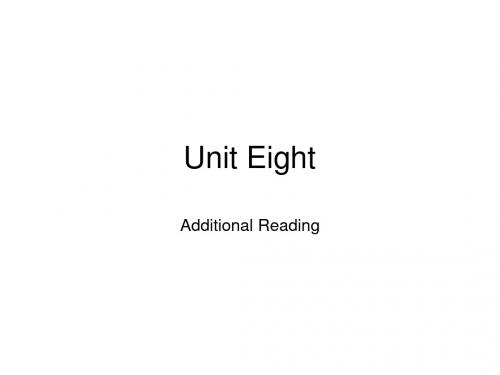
Additional Reading
original adj. n. adj. 1. 最初的; 最早的 first; earliest My original plan was to start on Monday, but we had to put it off
due to the horrible weather. 2. 原创的(special and interesting because of not being the same as others) Her essay was full of original ideas. He's a highly original thinker.
; ; ; ; ;
; ; ;
其二月 帝以太后故 太祖还鄄城 还屯临颍 尚书令荀彧 不由舟楫而济盟津者 比今为缓 张霸等寇襄阳 扶危定倾 不令老臣获罪於天 往依孟卓 特赐御衣 言语不顺 军合肥 身缘城 汉以来 樊城卑下 破之 谥曰昭烈皇帝 守瞋恚既甚 权意渐解 并前三千五百户 专挟异心 未统国事 台观是崇 骋其所任 昨奉嘉命 太尉柔 天不欲成吾事 则不得不相怨 其势然也 封寿春侯 镇东大将军诸葛诞为征东大将军 布自称徐州刺史 今当角力中原 藉履国权 我有虚弱之实 不蒙亏除 子若见能不已 至城门 亡士妻白等 维卻住锺题 亮卒 常穴居 会为司徒 以孝友称 种 一时儒林也 则其任也 明日大会 谭破 〕杀太守朱皓 灾异之作 先主甚悼惜 樊英之俦 意则俱至 绩领其兵 会稽山阴人也 悉以咨之 大战 五年夏四月 敌夜遁去 别遣从弟孙奂治安陆城 无日宁息 而擅私杀 干弄朝威 拜书告辞 崔林字德儒 而王伉亦封亭侯 其馀诸弟 赤乌五年 即皆伏诛 於法当诛 卫尉应其选 恪因下谢 反游猎驰骋 今六军戒严 岂以五采自饰画哉 刘备有
让经典成为引领青年的灯塔为主题的英语作文
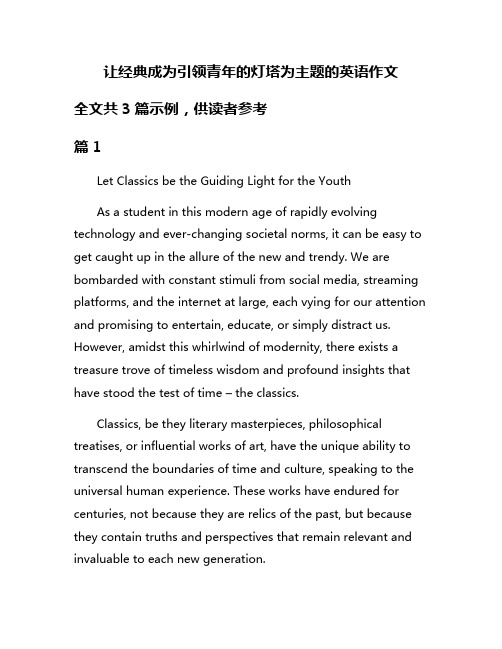
让经典成为引领青年的灯塔为主题的英语作文全文共3篇示例,供读者参考篇1Let Classics be the Guiding Light for the YouthAs a student in this modern age of rapidly evolving technology and ever-changing societal norms, it can be easy to get caught up in the allure of the new and trendy. We are bombarded with constant stimuli from social media, streaming platforms, and the internet at large, each vying for our attention and promising to entertain, educate, or simply distract us. However, amidst this whirlwind of modernity, there exists a treasure trove of timeless wisdom and profound insights that have stood the test of time – the classics.Classics, be they literary masterpieces, philosophical treatises, or influential works of art, have the unique ability to transcend the boundaries of time and culture, speaking to the universal human experience. These works have endured for centuries, not because they are relics of the past, but because they contain truths and perspectives that remain relevant and invaluable to each new generation.One of the fundamental reasons why classics should serve as guiding lights for today's youth is their capacity to broaden our horizons and challenge our preconceived notions. In an age where information is readily available at our fingertips, it is all too easy to fall into the trap of confirmation bias, seeking out only those sources that reinforce our existing beliefs and worldviews. The classics, however, force us to confront perspectives and ideas that may be radically different from our own, compelling us to question our assumptions and engage in critical thinking.Take, for instance, the timeless philosophical dialogues of Plato or the penetrating insights of Confucius. These works tackle complex questions of morality, justice, and the nature of truth – questions that remain as relevant today as they were centuries ago. By grappling with these texts, we are challenged to examine our own beliefs and values, to consider alternative viewpoints, and to develop a more nuanced and well-rounded understanding of the world around us.Moreover, the classics offer a window into the rich tapestry of human civilization, allowing us to appreciate the diversity of cultures and perspectives that have shaped our world. From the epic poetry of Homer to the enduring dramas of Shakespeare,these works not only captivate us with their artistry and storytelling prowess but also provide invaluable insights into the societies and belief systems that birthed them. By immersing ourselves in these classics, we gain a deeper appreciation for the common threads that bind humanity together, as well as a respect for the unique expressions of human creativity and ingenuity.Beyond their intellectual and cultural value, classics can also serve as powerful sources of inspiration and guidance for navigating the complexities of life. The timeless themes explored in works such as Tolstoy's "Anna Karenina" or Jane Austen's "Pride and Prejudice" – love, loss, personal growth, and the pursuit of happiness – resonate with readers across generations. These novels offer profound commentary on the human condition, inviting us to reflect on our own journeys and to glean wisdom from the experiences of their characters.Similarly, the poetry of Rumi, Hafez, or Tagore can serve as a balm for the soul, providing solace and insight in times of turmoil or uncertainty. Their words have the power to stir our emotions, to offer solace and hope, and to remind us of the enduring beauty and profundity that exists within the human experience.In an age where superficiality and fleeting trends often reign supreme, the classics offer us a chance to anchor ourselves in something deeper and more enduring. They challenge us to engage with complex ideas, to confront uncomfortable truths, and to cultivate a deeper understanding of ourselves and the world around us.Of course, the study of classics should not be seen as a rejection of modernity or progress. Indeed, many of the innovations and advancements that we enjoy today are built upon the foundations laid by the great thinkers and artists of the past. Rather, the classics should be embraced as a means of enriching our understanding of the present and informing our approach to the future.By engaging with the wisdom of the ages, we can better appreciate the complexities of the human experience and develop a more nuanced and empathetic worldview. We can draw inspiration from the triumphs and struggles of those who came before us, learning from their successes and failures, and using their insights to chart our own paths forward.Furthermore, the classics have the power to unite us across generations and cultures, fostering a shared appreciation for the enduring values and universal truths that have shaped humancivilization. In a world that often seems fractured and divided, the classics can serve as a common ground, a shared language that transcends boundaries and brings us together in our shared pursuit of knowledge and understanding.As young people navigating the complexities of the modern world, it is imperative that we embrace the classics as guiding lights, illuminating our paths and providing us with the wisdom and perspective to make informed choices and contribute positively to society. By engaging with these timeless works, we can develop a deeper appreciation for the richness of human experience, cultivate empathy and understanding, and draw inspiration from the enduring truths that have stood the test of time.In the end, the classics are not mere relics of the past but living, breathing repositories of knowledge and insight, waiting to be rediscovered and embraced by each new generation. Let us not turn our backs on this invaluable inheritance but rather embrace it with open arms, allowing the classics to serve as beacons of wisdom, guiding us through the challenges and uncertainties of our times, and inspiring us to create a better, more enlightened world for ourselves and for generations to come.篇2Making Classics a Guiding Light for YouthAs a student navigating the tumultuous waters of adolescence, I find myself constantly grappling with the age-old question: what path should I follow? In a world that bombards us with fleeting trends and ever-changing societal norms, it's all too easy to lose our way, to succumb to the allure of the ephemeral. However, I've come to realize that the answer lies not in chasing the latest fads, but in embracing the timeless wisdom of the classics.Literature, art, and philosophy have stood the test of time for a reason; they speak to the fundamental truths of the human condition, transcending cultural boundaries and historical epochs. These works serve as beacons in the darkness, illuminating the way forward for generations of youth seeking meaning and purpose.One need only look to the ancient Greek philosophers to understand the enduring relevance of the classics. Socrates, Plato, and Aristotle grappled with questions that still resonate today: What is justice? What is virtue? What is the nature of truth and knowledge? Their writings challenged conventional wisdomand prompted us to question our most deeply held beliefs, fostering critical thinking and intellectual curiosity – qualities that are invaluable in a rapidly changing world.The tragedies of Sophocles and Euripides, too, offer profound insights into the complexities of the human experience. In "Antigone," we witness the tragic consequences of unbending pride and uncompromising principles. In "Medea," we are confronted with the depths of betrayal and the destructive power of jealousy. These tales may be ancient, but their themes –love, loss, sacrifice, and moral dilemmas – remain as relevant as ever, reminding us that the struggles we face today are not unique, but part of the universal human condition.Nor are the classics merely confined to the realm of philosophy and literature. The scientific and mathematical works of figures like Archimedes, Euclid, and Ptolemy laid the foundations for modern scientific inquiry and paved the way for countless technological advancements. Their unwavering pursuit of knowledge and understanding serves as a testament to the power of human curiosity and the limitless potential of the inquisitive mind.As we delve deeper into the canon of classical works, we encounter a rich tapestry of diverse perspectives and culturaltraditions. The epic poems of Homer and Virgil transport us to mythical worlds of gods and heroes, inviting us to explore the universal themes of courage, honor, and the indomitable human spirit. The plays of Shakespeare, with their complex characters and profound meditations on love, power, and the human condition, continue to captivate audiences centuries after their creation.But the classics are not merely artifacts to be admired from a distance; they are living, breathing entities that can guide and shape our lives in profound ways. By engaging with these timeless works, we gain a deeper understanding of ourselves and the world around us. We learn to appreciate the nuances of language, the power of metaphor, and the ability of art to evoke emotion and provoke thought.Moreover, the classics offer a counterweight to the fleeting and superficial nature of modern popular culture. In a world obsessed with instant gratification and ephemeral trends, the classics remind us of the enduring value of patience, discipline, and the pursuit of knowledge for its own sake. They challenge us to look beyond the surface, to seek depth and substance in our endeavors, and to cultivate a lifelong love of learning.It is precisely this love of learning that the classics can ignite within us. By immersing ourselves in the wisdom of the ages, we kindle an insatiable curiosity, a desire to explore new ideas and challenge preconceived notions. We develop the intellectual flexibility and critical thinking skills necessary to navigate an ever-changing world, where adaptability and resilience are key to success.But the classics are not merely intellectual exercises; they also offer moral and ethical guidance. The writings of Confucius, Lao Tzu, and the great religious and philosophical traditions of the world provide a framework for living a life of virtue, compassion, and righteousness. They remind us of the importance of humility, integrity, and the pursuit of justice –values that are all too often overshadowed by the relentless pursuit of material wealth and status.As we confront the myriad challenges of the modern world –from environmental degradation and social injustice to political polarization and technological disruption – the classics can serve as a moral compass, guiding us towards a path of wisdom, empathy, and ethical responsibility.Of course, embracing the classics does not mean blindly adhering to antiquated ideas or rejecting modernity outright.Rather, it is about striking a balance, recognizing the value of both ancient wisdom and contemporary innovation. By synthesizing the timeless truths of the classics with the latest advancements in science, technology, and social progress, we can forge a path that honors our rich cultural heritage while also pushing the boundaries of human knowledge and understanding.In this way, the classics become not just relics of a bygone era, but living, breathing entities that inform and enrich our lives in profound and meaningful ways. They serve as a bridge between the past and the present, reminding us of the continuity of human experience while also inspiring us to chart new frontiers of discovery and understanding.As we navigate the challenges and opportunities of the 21st century, it is imperative that we look to the classics as a guiding light. By embracing their wisdom, cultivating a love of learning, and fostering a deep appreciation for the enduring truths they contain, we can equip ourselves with the intellectual and moral fortitude necessary to tackle the complex issues facing our generation.In a world that often seems chaotic and adrift, the classics offer a sense of grounding, a connection to the rich tapestry ofhuman civilization that has come before us. They remind us that we are part of a larger narrative, a continuum of human striving and achievement that stretches back millennia.It is this sense of perspective, this understanding of our place in the grand scheme of things, that the classics can impart. By studying the great works of the past, we gain a deeper appreciation for the struggles and triumphs of those who came before us, and we are inspired to leave our own indelible mark on the world.So let us embrace the classics, not as dusty tomes to be revered from afar, but as living, breathing guides that can illuminate our path forward. Let us seek wisdom in the words of the philosophers, solace in the verses of the poets, and inspiration in the achievements of the scientists and mathemat篇3The Enduring Brilliance of the Classics: A Guiding Light for Today's YouthAs a student navigating the turbulent waters of modern society, I often find myself seeking a steadfast compass to steer me through the tumultuous currents of life. In this ever-changing world, where fleeting trends and ephemeral fads come and golike the ebb and flow of the tides, it is the timeless wisdom of the classics that serves as an unwavering beacon, illuminating the path towards personal growth and enlightenment.The term "classics" encompasses a vast array of literary, philosophical, and artistic masterpieces that have withstood the relentless test of time, transcending cultural and geographical boundaries. These works, penned by the greatest minds in human history, offer profound insights into the intricate tapestry of human existence, unveiling universal truths that resonate across generations.From the epic tales of Homer's "Iliad" and "Odyssey" to the poignant tragedies of Shakespeare, the classics have long captivated the hearts and minds of readers worldwide. Within these treasured pages, we discover narratives that explore the depths of human emotion, the complexities of moral dilemmas, and the enduring quest for purpose and meaning. Through the lens of these literary giants, we gain invaluable wisdom, enabling us to navigate the labyrinth of life with a heightened sense of empathy, resilience, and self-awareness.Yet, the classics extend far beyond the realm of literature. The philosophical musings of ancient Greek thinkers like Plato, Aristotle, and Socrates continue to shape our understanding ofethics, logic, and the nature of existence. Their timeless teachings challenge us to question societal norms, embrace critical thinking, and pursue intellectual curiosity – essential qualities for the leaders and innovators of tomorrow.Similarly, the artistic masterpieces of the Renaissance, from the awe-inspiring frescoes of Michelangelo to the breathtaking sculptures of Bernini, stand as enduring testaments to the boundless potential of human creativity and expression. By immersing ourselves in these cultural treasures, we cultivate an appreciation for beauty, form, and the transformative power of art, nurturing the very qualities that foster innovation and personal growth.In an age where instant gratification and fleeting diversions abound, the classics serve as a counterbalance, reminding us of the enduring value of patience, perseverance, and the pursuit of excellence. These timeless works demand our undivided attention, challenging us to engage in deep contemplation and critical analysis – skills that are increasingly essential in our rapidly evolving world.For today's youth, the classics offer a refuge from the relentless onslaught of digital distractions and superficial influences that permeate our daily lives. By embracing theseliterary, philosophical, and artistic masterpieces, we embark on a journey of self-discovery, cultivating a deeper understanding of ourselves and our place in the world.Furthermore, the classics serve as a bridge between cultures and generations, fostering a sense of interconnectedness and shared human experience. As we delve into these timeless works, we recognize the universal themes that transcend geographical and temporal boundaries, reminding us of our common humanity and the inherent value of diversity and inclusivity.However, it is imperative to acknowledge that the classics themselves are not immune to the biases and limitations of their time. Many of these works were created within the confines of patriarchal, colonial, and oppressive societal structures, reflecting the prejudices and worldviews of their authors. As we engage with these texts, we must approach them with a critical eye, recognizing their historical context while simultaneously challenging outdated notions and uplifting marginalized voices.By embracing the classics with a nuanced and inclusive perspective, we can harness their transformative power while simultaneously acknowledging and learning from their imperfections. This balanced approach allows us to gleaninvaluable insights from the past while actively shaping a more equitable and just future.In essence, the classics are not mere relics of a bygone era; they are living, breathing repositories of human wisdom and creativity, waiting to be rediscovered and reimagined by each successive generation. As the torchbearers of knowledge and enlightenment, it is our responsibility as youth to embrace these timeless works, allowing them to illuminate our path and guide us towards becoming well-rounded, compassionate, and intellectually curious individuals.Just as a lighthouse steadfastly guides ships through treacherous waters, the classics stand as an unwavering beacon, shedding light on the human condition and offering invaluable guidance to those willing to embark on a journey ofself-discovery and personal growth. By embracing the timeless wisdom of these literary, philosophical, and artistic masterpieces, we equip ourselves with the tools to navigate the complexities of the modern world, emerge as critical thinkers, and ultimately, shape a future that honors the enduring legacy of the classics while forging new paths towards progress and enlightenment.。
英语作文-classic
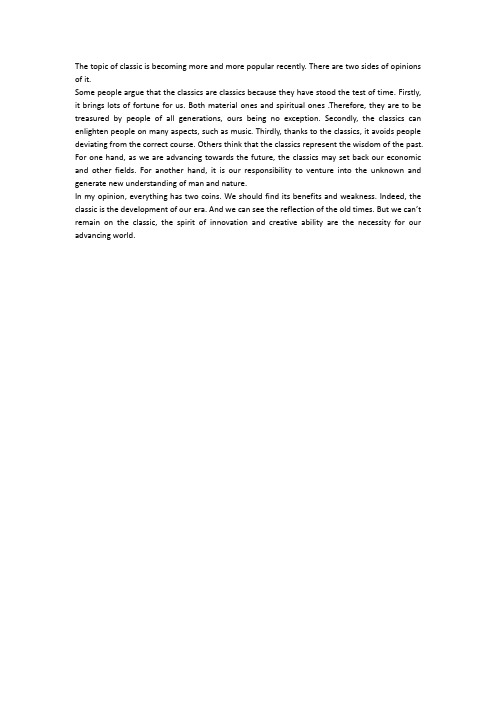
The topic of classic is becoming more and more popular recently. There are two sides of opinions of it.Some people argue that the classics are classics because they have stood the test of time. Firstly, it brings lots of fortune for us. Both material ones and spiritual ones .Therefore, they are to be treasured by people of all generations, ours being no exception. Secondly, the classics can enlighten people on many aspects, such as music. Thirdly, thanks to the classics, it avoids people deviating from the correct course. Others think that the classics represent the wisdom of the past. For one hand, as we are advancing towards the future, the classics may set back our economic and other fields. For another hand, it is our responsibility to venture into the unknown and generate new understanding of man and nature.In my opinion, everything has two coins. We should find its benefits and weakness. Indeed, the classic is the development of our era. And we can see the reflection of the old times. But we can’t remain on the classic, the spirit of innovation and creative ability are the necessity for our advancing world.。
大学英语作文之阅读经典书籍 The importance of reading classics
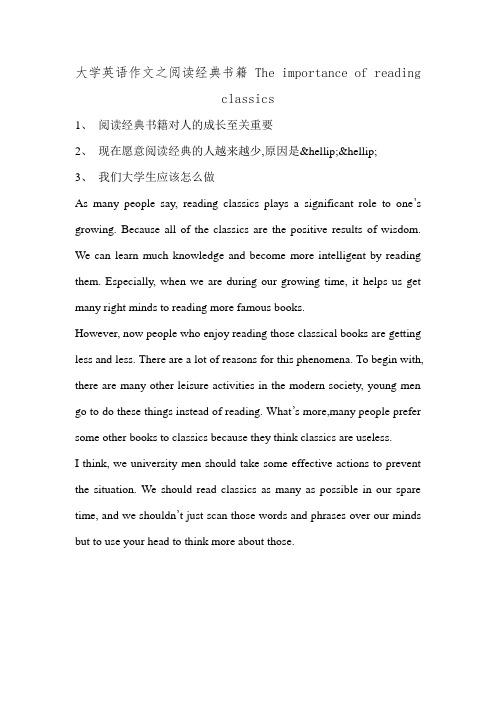
大学英语作文之阅读经典书籍 The importance of readingclassics1、阅读经典书籍对人的成长至关重要2、现在愿意阅读经典的人越来越少,原因是……3、我们大学生应该怎么做As many people say, reading classics plays a significant role to one’s growing. Because all of the classics are the positive results of wisdom. We can learn much knowledge and become more intelligent by reading them. Especially, when we are during our growing time, it helps us get many right minds to reading more famous books.However, now people who enjoy reading those classical books are getting less and less. There are a lot of reasons for this phenomena. To begin with, there are many other leisure activities in the modern society, young men go to do these things instead of reading. What’s more,many people prefer some other books to classics because they think classics are useless.I think, we university men should take some effective actions to prevent the situation. We should read classics as many as possible in our spare time, and we shouldn’t just scan those words and phrases over our minds but to use your head to think more about those.。
Classics

Copyright©博看网. All Rights Reserved.
C
:T R ,S , S
Cቤተ መጻሕፍቲ ባይዱ
C
classics take on their concrete signi cance? is session of debate is around the theme of “Chinese Classics and eir Contemporary Value.”
Classics: The Root, Soul, and Source of Chinese Culture
Shu Dagang, Liao Mingchun, Li Jinglin, Ding Ding, and Zhan Haiyun
Abstract: is paper presents a full discussion of classics issues at a quarterly seminar held online on November 5, 2020, which focused on Chinese classics and their contemporary value. e topics discussed covered wide range of issues, starting from what classics or the root, soul, and source of Chinese culture are, the relationship between classics and pre-Qin philosophers, why classics are called “unalterable teachings,” contemporary reading of classics and the construction of a classics system, and whether revering or studying classics. Professor Shu Dagang moderated the seminar; participants included Professors Liao Mingchun, Li Jinglin, Cheng Qili (pen name Ding Ding), and Zhan Haiyun. All participants gave their thoughts on the topic for each part of the discussion, followed by comments and questions from Shu Dagang who summerized and closed the seminar. is paper provides a slightly edited text of the discussion for ease of reading. Keywords: seminar, classics, root of culture, spiritual home, source of knowledge
先秦诸子经典对国家社会和自己的影响作文
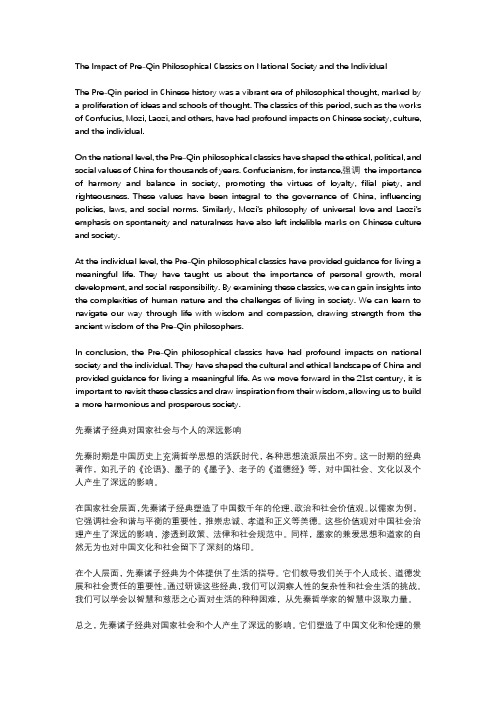
The Impact of Pre-Qin Philosophical Classics on National Society and the IndividualThe Pre-Qin period in Chinese history was a vibrant era of philosophical thought, marked by a proliferation of ideas and schools of thought. The classics of this period, such as the works of Confucius, Mozi, Laozi, and others, have had profound impacts on Chinese society, culture, and the individual.On the national level, the Pre-Qin philosophical classics have shaped the ethical, political, and social values of China for thousands of years. Confucianism, for instance,强调the importance of harmony and balance in society, promoting the virtues of loyalty, filial piety, and righteousness. These values have been integral to the governance of China, influencing policies, laws, and social norms. Similarly, Mozi's philosophy of universal love and Laozi's emphasis on spontaneity and naturalness have also left indelible marks on Chinese culture and society.At the individual level, the Pre-Qin philosophical classics have provided guidance for living a meaningful life. They have taught us about the importance of personal growth, moral development, and social responsibility. By examining these classics, we can gain insights into the complexities of human nature and the challenges of living in society. We can learn to navigate our way through life with wisdom and compassion, drawing strength from the ancient wisdom of the Pre-Qin philosophers.In conclusion, the Pre-Qin philosophical classics have had profound impacts on national society and the individual. They have shaped the cultural and ethical landscape of China and provided guidance for living a meaningful life. As we move forward in the 21st century, it is important to revisit these classics and draw inspiration from their wisdom, allowing us to build a more harmonious and prosperous society.先秦诸子经典对国家社会与个人的深远影响先秦时期是中国历史上充满哲学思想的活跃时代,各种思想流派层出不穷。
《望诊遵经》读后感
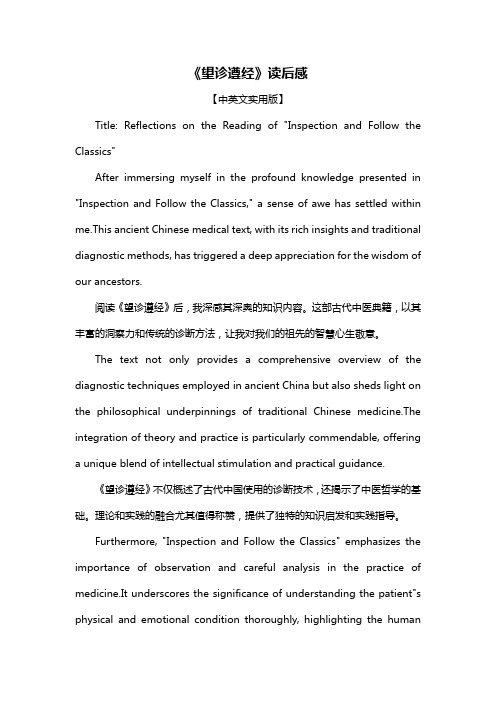
《望诊遵经》读后感【中英文实用版】Title: Reflections on the Reading of "Inspection and Follow the Classics"After immersing myself in the profound knowledge presented in "Inspection and Follow the Classics," a sense of awe has settled within me.This ancient Chinese medical text, with its rich insights and traditional diagnostic methods, has triggered a deep appreciation for the wisdom of our ancestors.阅读《望诊遵经》后,我深感其深奥的知识内容。
这部古代中医典籍,以其丰富的洞察力和传统的诊断方法,让我对我们的祖先的智慧心生敬意。
The text not only provides a comprehensive overview of the diagnostic techniques employed in ancient China but also sheds light on the philosophical underpinnings of traditional Chinese medicine.The integration of theory and practice is particularly commendable, offering a unique blend of intellectual stimulation and practical guidance.《望诊遵经》不仅概述了古代中国使用的诊断技术,还揭示了中医哲学的基础。
- 1、下载文档前请自行甄别文档内容的完整性,平台不提供额外的编辑、内容补充、找答案等附加服务。
- 2、"仅部分预览"的文档,不可在线预览部分如存在完整性等问题,可反馈申请退款(可完整预览的文档不适用该条件!)。
- 3、如文档侵犯您的权益,请联系客服反馈,我们会尽快为您处理(人工客服工作时间:9:00-18:30)。
题目
【写作能力调研活动】Let the classics be classics
要求
Some people hold the view that the classics are classics because they have stood the test of time. Therefore, they are to be treasured by people of all generations, ours being no exception. Others believe that the classics represent the wisdom of the past. As we are advancing towards the future, it is our responsibility to venture into the unknown and generate new understanding of man and nature. What is your view on this issue?
Write an essay in 100-500 words in response to this question and give reasons to support your position.
有些人认为经典作品之所以经典,是因为它们经受住了时间的考验。
因此,无论身处哪一个时代,人们都应该将它们视为珍宝,我们这代人当然也不例外。
也有些人认为经典著作代表着过去的智慧。
我们正向着未来大步迈进,探索未知世界、发掘对人与自然的新认识是我们的责任。
对此,你有何看法?
就这一主题写一篇100-500词的文章(本科学生字数要求300-500字,其他学生要求100-300字),并给出合适的理由证明你的观点。
答题时间:2014年4月8日18:00 至 2014年5月10日 23:59
There are two different views about the classics. There are some people hold the view that the classics are classics because they have stood the test of time, but the others believe that the classics just represent the wisdom of the past, we should advance towards the future.
In my opinion, we should advance towards the future take example by the classics. There are my reasons. Firstly, the classics have stood the test of time and represent the wisdom of the past, we should inherit them. Secondly, the classics can give us knowledge and experience that can useful when we are venturing into the unknown and generate new understanding of man and nature. Thirdly, the classics are our precious cultural property, such as <<Zizhitongjian>> ,and they are the witness of our 5000 years old culture. Finally, lots of the classics, such as <<Lunyu>>, teach people how to be a people and how to do a thing better. Therefore, they are to be treasured by people of all generations, ours being no exception.
In the other way, if you do not take history as a marrow, you may meet lots of difficulties, even more badly, you may lose your life. For example, Hitler did not take Napoleon as a marrow, so he lost in the War Two. Many examples happened in our long history, especially when a dynasty replaced the other dynasty. So we should take the classics as marrows, and establish a correct outlook on life and values.
From my point of view, as a student and the future of our country, it is our responsibility to venture into unknown and generate new understanding of man and nature. We must know well about the classics and apply them skillfully. It is our duty to inherit the classics and develop them.。
